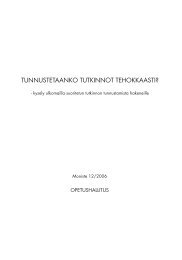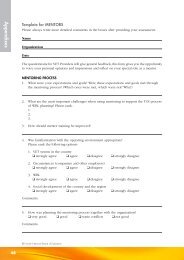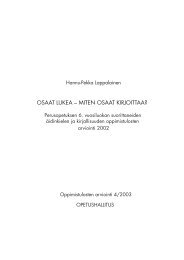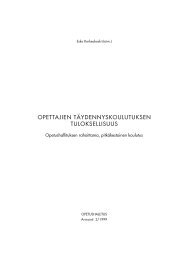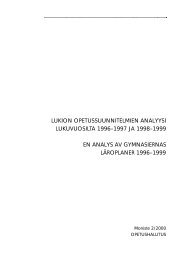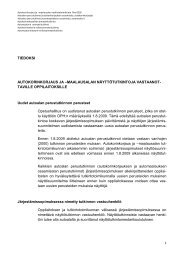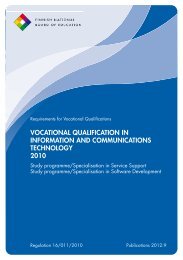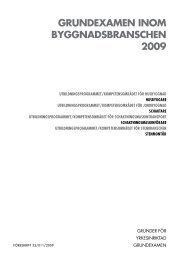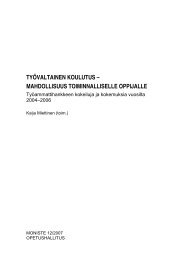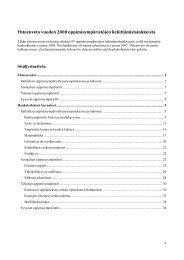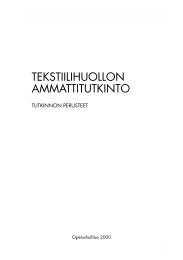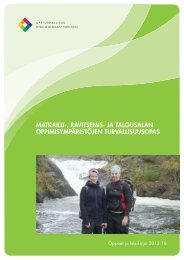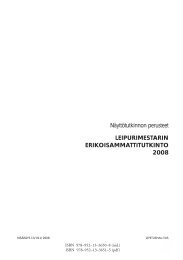School Library A Good
School Library A Good
School Library A Good
You also want an ePaper? Increase the reach of your titles
YUMPU automatically turns print PDFs into web optimized ePapers that Google loves.
For the needs of the staff the school library collection needs<br />
to offer sufficient material and services which facilitate keeping<br />
up with the development of teaching and the specialised<br />
fields, research and experiments.When planning a school<br />
library it should be remembered that collection work requires<br />
• cabinet or storage space for newly acquired material,<br />
material under repair or in storage<br />
• desk space for handling material (bar code stickers,<br />
classification marks, covering books with plastic and<br />
repairing them)<br />
• computer based library system for catalogueing, locating<br />
and borrowing the material (in small schools a card index<br />
may be sufficient)<br />
• printer, fax, telephone<br />
Information retrieval<br />
The most important function of the school library as defined<br />
in the school curriculum is information retrieval<br />
• Pupils learn to learn i.e. understand information structures,<br />
concepts and how knowledge can be shared or information<br />
retrieved, as well as how to assess the validity or necessity<br />
of information.<br />
• Pupils are familiar with an area in the library where they<br />
can find nonfiction literature, magazines, CD-ROMs,<br />
recordings, videos and computers that can be used for<br />
seeking information<br />
• Pupils learn the principles of information organisation<br />
used in the school library so that they will be able to use<br />
the classification system to their advantage and locate the<br />
information they need<br />
• From the content and terminology of the material pupils<br />
learn which higher category contains what type of<br />
information and which things are related to each other and<br />
also what is relevant in the information.<br />
In the area reserved for information retrieval and modification<br />
• book shelves, organised logically in appropriate fields<br />
• magazine racks<br />
• electornic/digital study material<br />
• computers, Internet access<br />
• work tables<br />
• CD player, television, VCR<br />
In addition to information retrieval this space is used for<br />
reading, making notes and for modifiction previously gathered<br />
information. Shelves may be used as space dividers to create<br />
separate “cells” with tables for group work or with individual<br />
work stations.<br />
If the school library material is catalogued into a computer<br />
based database and made keyword searchable pupils can<br />
seek information in their own school library collection by<br />
using a word search. For older pupils the Aleksi database is<br />
a good way to gather latest information as it contains a<br />
number of references of magazines. Via access to the Internet<br />
every pupil has the opportunity to be a user of different kinds<br />
of information and of many different databases (e.g. the<br />
collection registers of municipal libraries); the organisation<br />
and assessment of these poses a big challenge for teaching.<br />
Once pupils learn the principles governing books and library<br />
activities they are in a much better position for learning to<br />
organise information obtained from the Internet.<br />
It is the easiest and most meaningful way to learn how to<br />
retrieve information in the school library premises. Pupils will<br />
get familiar with the ladder of information with guidance from<br />
their teacher and the school librarian starting from the first<br />
grade in basic education. Weekly use of the school library,<br />
familiarising the material and the classification system together<br />
with practicing information retrieval in the library guide pupils<br />
to learn and find strategies suitable for them. Acquiring these<br />
skills requires systematic practise.<br />
Exhibitions of student work can be held in the information<br />
retrieval area and it is possible to have longer essays catalogued<br />
into the school library system for others to see. Doing this<br />
teaches pupils to appreciate their work, understand the<br />
significance of knowledge and evaluate information for its<br />
reliability (source critique), and also to appreciate other<br />
people’s work (copying or using for reference). The school<br />
library is a study place that belongs to everyone equally. It is<br />
not meant for any one teacher of group of pupils but for<br />
everyone working in the school.<br />
A <strong>Good</strong> <strong>School</strong> <strong>Library</strong>



